What Does Kung Pao Beef Look Like
Hey – you've made it this far, so now we're basically best friends! If you make this recipe, I'd love for you to give it a quick review & star rating ★ below. Make sure you follow me on Instagram, Pinterest, TikTok, and Facebook, too!
- 1 pound flank steak thinly sliced
- 3 tablespoons cornstarch
- salt and pepper to taste
For the Sauce
- 3 tablespoons soy sauce
- 2 tablespoons chili sauce
- 1 tablespoon granulated sugar
- 2 tablespoons Chinese black vinegar
- 1 tablespoon rice wine vinegar
- 1 teaspoon cornstarch
For the Stir Fry
- 3 tablespoons neutral cooking oil
- 6 dried red Thai chiles
- ½ teaspoon Sichuan peppercorns
- 4 scallions white and green parts divided, chopped
- 3 cloves garlic minced
- 1 1-inch piece fresh ginger grated
- 1 bell pepper core and seeds removed, chopped
- ½ cup roasted peanuts
-
Large bowl
-
Medium bowl
-
Large skillet
-
Place beef in large bowl and add cornstarch, salt, and pepper. Toss or stir to coat beef completely.
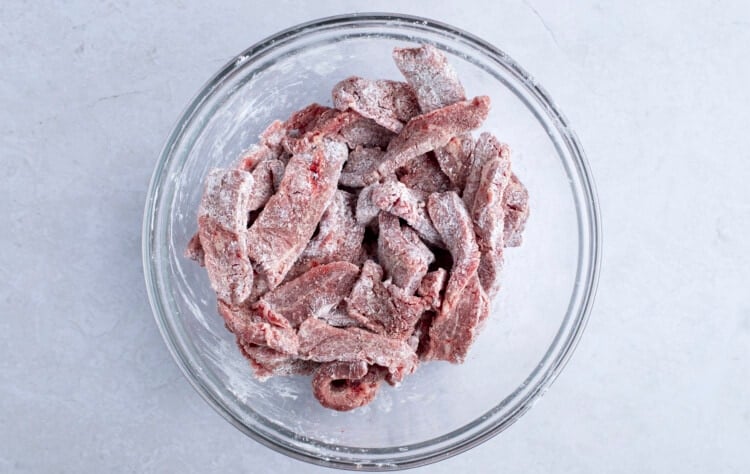
-
In separate bowl, mix together all sauce ingredients. Set aside.
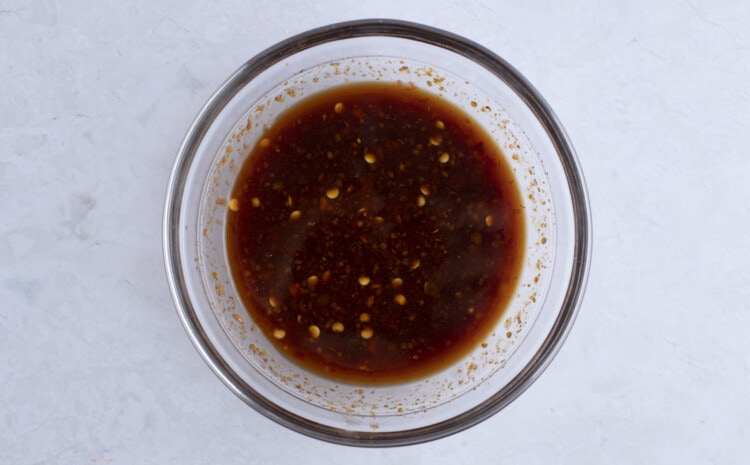
-
In large skillet over medium-high heat, cook beef 2 to 3 minutes, stirring occasionally until brown.
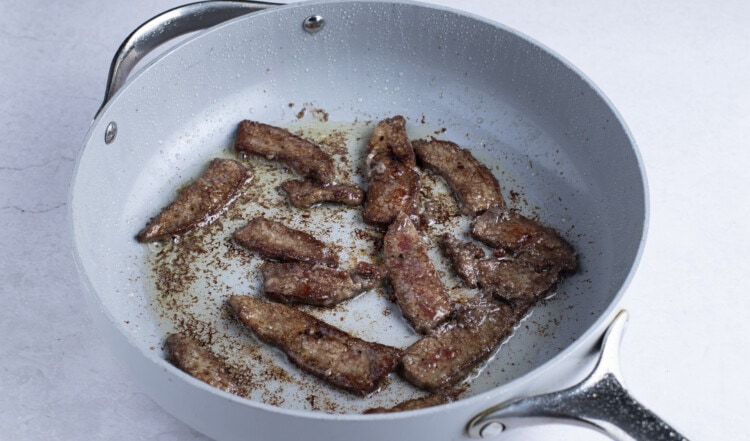
-
Transfer beef to plate or bowl and set aside. Add cooking oil to skillet and heat. When hot, add Thai chilis and Sichuan peppercorns. Cook approximately 1 minute.
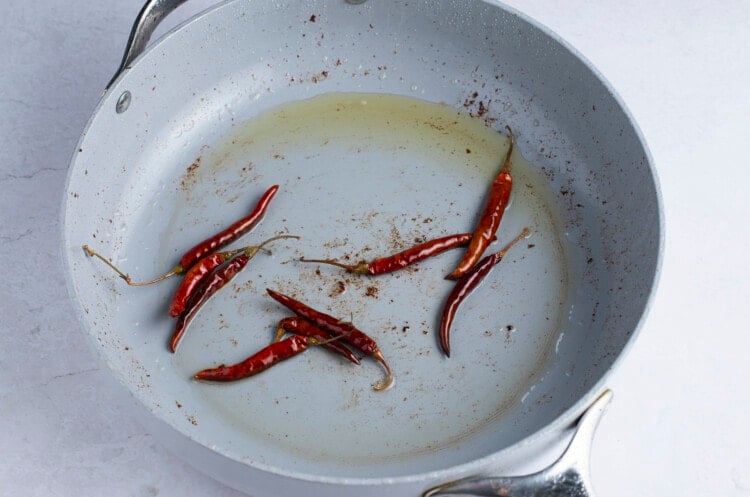
-
Add white parts of scallions, garlic, and ginger to skillet. Cook until fragrant, approximately 1 to 2 minutes.
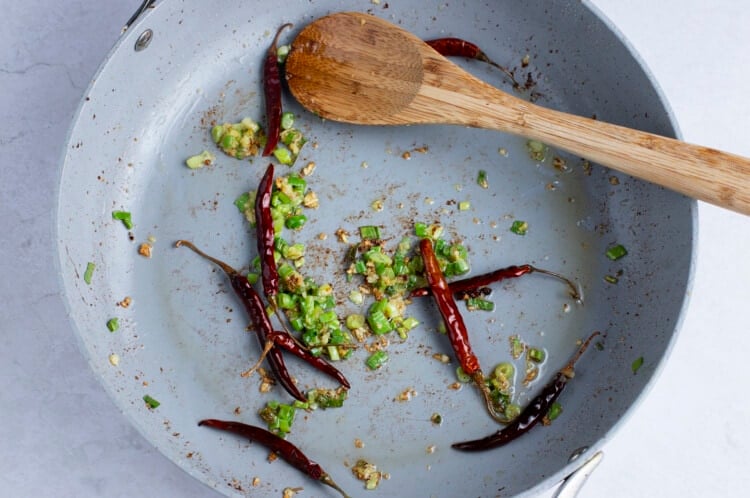
-
Add chopped bell pepper and peanuts to skillet and cook 1 additional minute.
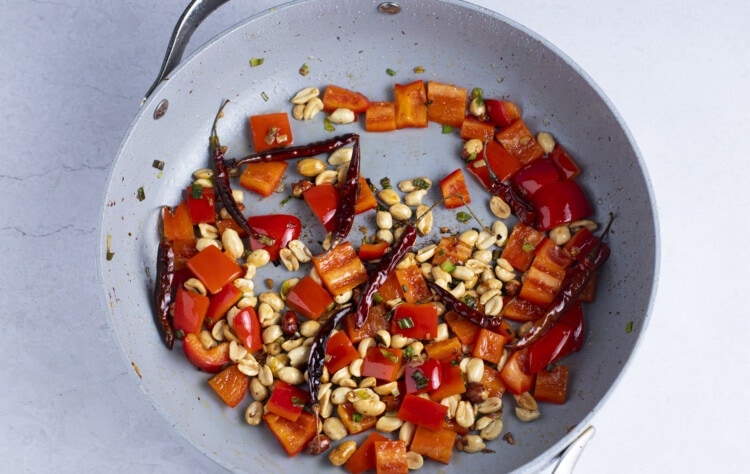
-
Return beef to skillet, then pour in sauce mixture. Cook until sauce thickens. Garnish with green parts of scallions and serve.
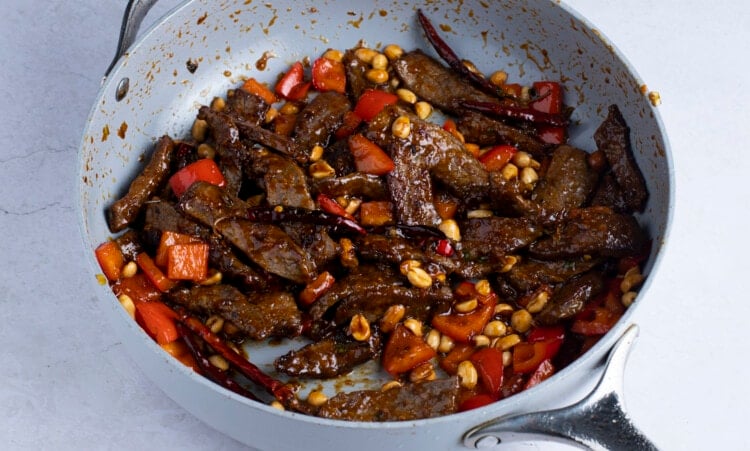
- Soy Sauce: Use low sodium soy sauce if you're watching your sodium intake.
- Chinese Black Vinegar: Make sure to use Chinese black vinegar, and don't use a sweetened version. If you can't find it, you can use an equal amount of rice wine vinegar or plain white vinegar, but the flavor will be slightly different. Balsamic vinegar would also work in a pinch, as long as it's not syrupy and sweet.
- Dried Red Thai Chiles: If you're sensitive to heat, cut the number of chiles from 6 down to 3 or 4. You can also cook with the chiles, then take them out before serving so you don't actually eat them, which will give you their flavor without as much of their intensity.
- To Serve: Enjoy kung pao beef on its own or with a side of white rice, cauliflower fried rice, or noodles.
- Make it Added-Sugar Free: Use granular Swerve in place of the granulated sugar in the sauce.
Recipe yields approximately 4 servings. Actual number of servings will depend on your preferred portion sizes. Nutritional values shown are general guidelines and reflect information for 1 serving out of 4, using the ingredients listed. Actual macros may vary slightly depending on specific brands and types of ingredients used.
To determine the weight of one serving, prepare the recipe as instructed. Weigh the finished recipe, then divide the weight of the finished recipe (not including the weight of the container the food is in) by 4. Result will be the weight of one serving.
Serving: 1 serving , Calories: 427 kcal , Carbohydrates: 18 g , Protein: 32 g , Fat: 25 g , Saturated Fat: 5 g , Polyunsaturated Fat: 6 g , Monounsaturated Fat: 13 g , Trans Fat: 1 g , Cholesterol: 68 mg , Sodium: 998 mg , Potassium: 706 mg , Fiber: 3 g , Sugar: 6 g , Vitamin A: 1155 IU , Vitamin C: 53 mg , Calcium: 63 mg , Iron: 3 mg , Net Carbs: 15 g
Number of total servings shown is approximate. Actual number of servings w ill depend on your preferred portion sizes.
Nutritional values shown are general guidelines and reflect information for 1 serving using the ingredients listed, not including any optional ingredients. Actual macros may vary slightly depending on specific brands and types of ingredients used.
To determine the weight of one serving, prepare the recipe as instructed. Weigh the finished recipe, then divide the weight of the finished recipe (not including the weight of the container the food is in) by the desired number of servings. Result will be the weight of one serving.
Source: https://40aprons.com/kung-pao-beef/
0 Response to "What Does Kung Pao Beef Look Like"
Post a Comment